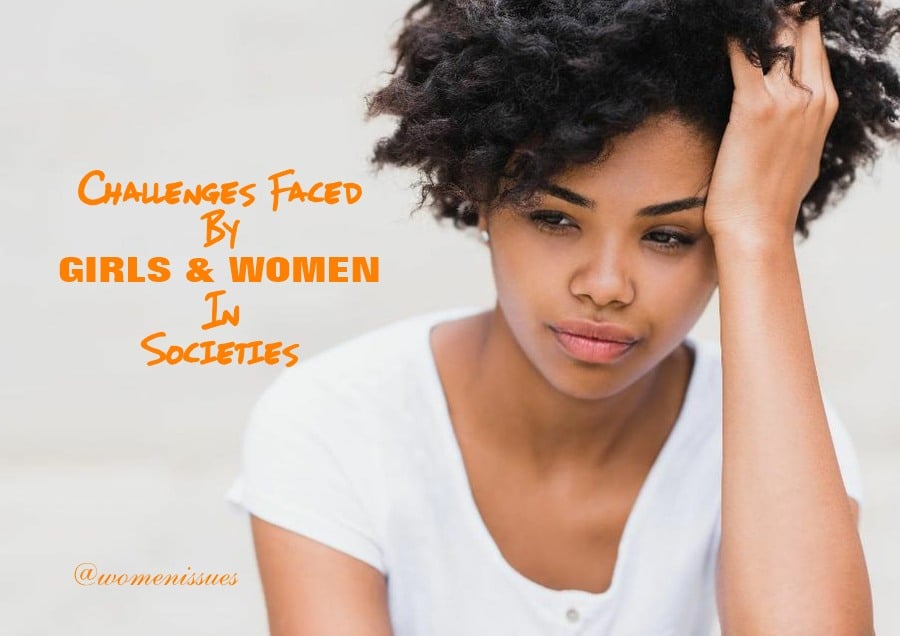Challenges faced by girls and women in societies
Women are very important in societies that we all come from. Every woman has her own duty or job in this modern society in which men are still the dominant gender. We can´t overlook the fact that women´s life is a lot more complicated than a man´s life. A lady needs to deal with her very own life and in the event that she is a mother, she needs to think additionally about her kids’ life as well. Married women have lots of worries and believe it or not, they carry out a more stressful life than married men. Let’s take a look at some of the key issues that women are facing in the societies that there are living in. We put together this list of key issues affecting girls and women worldwide.
1. Gender Inequality
Sexual orientation equity implies that people have equivalent power and equivalent open doors for monetary freedom, instruction, and self-awareness. Being at par is a recurring issue when it comes to women and girls, whether it is unequal access to schooling for girls in developing countries or unequal pay for women in the workplace. In a world where 95% of countries are led by a male head of state, it is clear that we as a global community have a long way to go before women are given a reasonable stake.
2. Gender-based Violence
Domestic violence is another top concern for women, though this issue likewise affects men. Research reveals that 1 in 3 women experience physical or sexual violence in their lifetimes, according to WHO. Manipulation and brutality do not come in a solitary structure, either. From psychological and emotional abuse to sexual and physical abuse, this continues to be a growing problem. Whether it is rape, domestic abuse, or sex trafficking, gender-based violence denies far too many women the opportunity to live happy, healthy, and fulfilling lives.
3. Early Marriage
Early child marriage is defined as the marriage of a girl or boy before the age of 18. Early marriage denies girls their right to make vibrant decisions about their sexual health and well-being. It drives them out of education and into a life of poor possibilities, with an expanded danger of brutality, misuse, sick wellbeing or early passing. Little youngsters who wed before 18 years are typically denied an education, in danger of difficulties related to premature childbearing, and more vulnerable to intimate partner violence.
4. Access to Education
The state of girls’ education has improved meaningfully. Be that as it may, young ladies keep on falling behind young men, in numerous pieces of the globe, as far as access to education, completion of education, and acquisition of basic skills such as literacy. Every day, girls face barriers to education caused by poverty, cultural norms, and practices, poor infrastructure, violence, and fragility. A study carried out revealed that thirty-one million young ladies of elementary school age were not in school and around one out of each four young girls in developing nations had never completed their primary school education. That number speaks to a huge pool of undiscovered young lady influence: that equivalent report proposes that educated ladies are bound to get hitched later, endure labour, bring up sound children, look for some kind of employment, and earn more money, among different positives.
5. Female Genital Mutilation
Female genital mutilation refers to any practice relating to partial or total removal of the external female genitalia or other injuries to the female private parts for non-medical reasons. It is a mind-boggling issue with religious and cultural implications for the gatherings who practice it. In countries where it is practiced, FGM is supported by both men and women, usually without question. However, the reasons for the practice are regularly centred in gender inequality. Whatever the purpose for it, FGM violates the human rights of girls and women and denies them of the chance to make critical, informed choices about their bodies and lives.
6. Water & Sanitation
At the point when clean drinking water and hygienic sanitation facilities are scarce, women and girls endure most. For example, girls whose schools lack proper bathrooms will often skip school during their menstrual periods for fear of embarrassment or stigma. An absence of sufficient private toilets and clean water to wash hands in schools, and the working environment, making it difficult for girls and women to take care of periods. This means teenage girls either miss school once a month or they drop out altogether. It is likewise a hindrance for ladies going to work and earning an income. It is also true that women in developing countries are frequently tasked with fetching water, which can be a time-consuming process whilst these girls and women of the world have much better activities to spend their time on than running around with buckets.
7. Poor Health
It is not only the task of collecting water that falls to the females in the family, but women also deal with dirty water after it has been used. Women are more likely to be in the home and they are more likely to be associated with sanitation, for example, looking after young children. They are more in danger of sickness due to pathogens as an outcome of their exposure to wastewater. Women are also more likely to be exposed to pathogens and toxins when it comes to reusing wastewater for growing food.
8. Employment Opportunities
Around the globe, getting a new line of work is a lot harder for ladies than it is for men. At the point when ladies are employed, they will in general work in low-quality occupations in vulnerable conditions, and there is little improvement gauge sooner rather than later. Even in a country as wealthy and developed as South Africa, women still experience major inequality in the workforce: By some estimates, women earn only 7 South African rand for every 10 South African rand earned by men. All-inclusive, the gender gap is even wider, ladies acquire just a single tenth of the world’s income regardless of working 66% of the total work hours.
In conclusion we can say women and girls are being affected by a lot of issues in the communities that they come from. Dealing with these challenges which are being faced by women will not only help women but also our fellow clueless men around the globe. Stay tuned to Women Issues as we explore different ways which we can use in favor of women.


No Comment